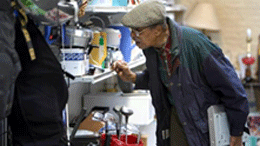 With consumers scrimping, thrift shops are booming
Jenn Abelson
With consumers scrimping, thrift shops are booming
Jenn Abelson
With consumers scrimping, thrift shops are booming Mainstream merchants are struggling
while many secondhand stores post record sales and expand
 Secondhand
stores had never appealed to Rosa Medeiros. But her sister-in-law recently persuaded
Medeiros to check out resale merchant Children's Orchard in Milford. These days,
Medeiros is shopping at the thrift store for her 10-month-old son instead of at
trendy tyke shops such as Babies 'R' Us and Baby Gap. Last week, she was at Children's
Orchard buying a basket of gently used toys for $7 that would have cost $30 new.
Secondhand
stores had never appealed to Rosa Medeiros. But her sister-in-law recently persuaded
Medeiros to check out resale merchant Children's Orchard in Milford. These days,
Medeiros is shopping at the thrift store for her 10-month-old son instead of at
trendy tyke shops such as Babies 'R' Us and Baby Gap. Last week, she was at Children's
Orchard buying a basket of gently used toys for $7 that would have cost $30 new.
"I was never too fond of thrift stores," said Medeiros, 28, of Uxbridge, who stopped
working after the birth of her son. "But Children's Orchard is really neat and clean.
And with only one income and the uncertainty in the economy, I'm putting away every
cent I can and spending as little as possible."
As consumers tighten their purse strings amid the economic slowdown, many mainstream
merchants are shuttering outlets, slashing prices, and struggling just to get customers
in the doors. But thrift stores and resale shops are expanding their operations
and preparing for one of the busiest holiday seasons ever as more people buy and
sell used toys, clothes, and shoes.
The numbers are telling: In October, retail sales fell 2.8 percent - the largest
percentage decline since 1992 - led by declines at big merchants such as Nordstrom
Inc. and Best Buy Co. Meanwhile, Morgan Memorial Goodwill Industries earned a record
$1 million in sales in October from its nine stores, a 30 percent increase from
last year. Second Time Around, a chain of 16 consignment shops stretching from Washington,
D.C., to Maine, had a nearly 20 percent boost in revenues in the past year. And
Children's Orchard has seen a roughly 15 percent increase in business over the past
few months.
The National Association of Resale and Thrift Shops said members across the country
are reporting an average 30 percent increase in business from January through August
compared with the year-ago period, with a 75 percent increase in people donating
or selling their clothes to consignment shops.
The overall resale industry has been strong in recent years, particularly among
higher-end shops, as consumers have grown increasingly comfortable with buying used
merchandise on sites such as eBay and Craigslist. And the seismic economic shocks
rocking Americans in recent months have frugal customers on the hunt for bargains
in a serious way.
"Everyone's struggling, and people want value. They don't feel as bad buying stuff
in our stores because the price is 25 percent of retail price," said Jeff Casler,
owner of Second Time Around, which has nine shops in Massachusetts, largely in wealthy
neighborhoods. "Even the affluent are hurting. It's not a paycheck-to-paycheck struggle.
But they are concerned about their jobs, and their retirement is down 40 percent."
For the holidays, Second Time Around is offering its first-ever discount for shoppers
during Thanksgiving weekend, giving a 20 percent discount on all merchandise. Casler
is also capitalizing on other retailers' woes by buying excess merchandise from
struggling or bankrupt shops. And while many merchants are shuttering stores, Second
Time Around plans to expand the chain and is currently negotiating leases for four
stores.
At Children's Orchard in Milford, owner Gayle Gonthier Bell is expecting a strong
holiday season, unlike many merchants who are predicting flat sales or worse. The
chain, which has 70 stores nationwide, is planning to add another 100 shops in the
next five years.
Children's Orchard features a mix of new and gently used merchandise, including
toys from Melissa & Doug and My Little Pony sets. For consumers looking to sell
toys, Children's Orchard offers several options, including cash or store credit
with additional bonuses.
Gonthier Bell is hoping to drive even more traffic with a 20 percent promotion after
Thanksgiving.
"I want to give people a jump-start on their favorite gifts before going to retailers
who are going to charge them three times as much," she said.
Goodwill chief executive Joanne Hilferty said the organization has benefited from
upgrades to its stores, a weak economy, and a growing acceptance of shopping at
thrift stores. Goodwill plans to open two stores next year.
"People seem to be much more comfortable about having secondhand clothes. People
used to whisper to me at meetings that they got their clothes at Goodwill," Hilferty
said. "Now they are willing to say it publicly."
Despite a boom in sales, the challenge now facing Goodwill is a slowdown in donations.
In a weak economy, many people hold onto their old clothes longer and others look
for resale stores that pay for used merchandise, instead of donating to Goodwill.
At the new Goodwill shop on Commonwealth Avenue, business has been brisk since it
opened in May. Yan Sun shops there weekly, recently buying household items such
as cabinets and a slow cooker.
"I can find what I need for cheap," Sun said. "These days, I'm always looking for
good deals."